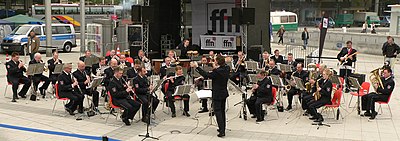Police Orchestra Lower Saxony
The Lower Saxony Police Orchestra is a wind orchestra based in Hanover and an organizational unit of the Lower Saxony Police . Thomas Boger has been the conductor since February 1st, 2009 . The orchestra performs primarily in public and serves to maintain relationships with the population. It also plays at internal police events.
profile
Today (2010) around 40 musicians belong to the orchestra. Her musical training took place at the Hanover University of Music and Theater and a music school in Braunschweig. Originally, the members of the police orchestra were all police officers . Today, trained musicians are also taken on as employees in order to avoid double training as police officers and musicians. The orchestra is subordinate to the Central Police Directorate in Hanover and has its seat in an office building on Welfenplatz in Hanover.
With its public concerts, among other things at charity, benefit or anniversary events, it is used for public relations as well as for image cultivation of the police. Appearances are also made at official and representative events of the police and regional authorities.
Occupations
Within the orchestra, the musicians formed into smaller music groups. There are the occupations:
- Big Band
- Jazz combo
- Blow cast
as well as the chamber music ensembles:
- Brass quintet
- Trombone quartet
- Saxophone quartet
- Clarinet quartet
School workshops
The Niedersachsen Police Orchestra conducts workshops with students in schools as part of their music lessons. Between 1999 and 2009 there were 150 events, which also serve to break down inhibitions towards uniformed police officers.
history
founding

The forerunner of the police orchestra was the "Band of the Royal Prussian Protection Team in Hanover", founded in Hanover in 1909, with around 20 musicians. The protection team belonged to the Royal Prussian Police Administration and was a purely civil authority. The protection team made up of former soldiers, who transferred to the police service with the civil service certificate at the end of their service life, was expanded.
When the First World War broke out, the orchestra disbanded because many musicians were called up for military service. After the war, the "Musikkapelle der Schutzpolizei Hannover" was founded in 1920 as a voluntary association of police members. Making music was a sideline for her alongside her police service. During the National Socialist era , the orchestra lost many younger musicians, as they were assigned to regimental bands when the state police were incorporated into the Wehrmacht in 1935 . During the reorganization of the Reich Police in 1937, this measure was reversed, and qualified musicians enriched the band.
Second World War
At the beginning of the Second World War , young musicians were called up for military service in police units. From 1940 onwards, the remaining police musicians in Hanover did their job at police stations. The game business continued with concerts in hospitals, factories, circuses and swearing-in ceremonies in order to maintain the mood and the will to win of the population. Games were also played in front of prisoners of war. At the end of 1941 the band was used in Russia. In 1943 the band dissolved because most of the musicians were drafted. Only a reserve music corps carried out an emergency operation.
post war period
In the early post-war period , the British military government demanded the erection of a police chapel in July 1945. Since 36 police officers had to be recruited for this, the establishment was initially rejected for budgetary reasons. In November 1945, was the chapel ready and played as Band of the Police Hannover exclusively in the Hanover area. Only after it was integrated into the riot police under the name of the Music Corps of the Riot Police of the State of Lower Saxony did the spatial field of activity expand. During this time the orchestra took part in post-war films such as “ Liebe 47 ” and “ Königliche Hochheit ”. In the 1950s, the military band extended its sphere of influence even further to spa concerts in Lower Saxony and North Rhine-Westphalia resorts and on the East Frisian Islands , also in police shows at home and abroad. When the police in Lower Saxony was reorganized in 1972, the name was changed to Police Music Corps Lower Saxony. On 12 July 2012, the orchestra was the Lower Saxony Interior Minister Uwe Schünemann in Polizeiorchester Lower Saxony renamed. The reason given for the renaming was that the designation corps is mainly used in the military sector and no longer fits into the image of a community-based police force.
Discography
Eight phonograms have been recorded since 1975. There are three LPs, one MC and four CDs (Compliment - 2009, Solissimo - 2005, Our beautiful Lower Saxony, Help with music).
Previous leaders
|
literature
- Günther Meinecke: The Lower Saxony Police Music Corps in: Lower Saxony and its police: Published by the Lower Saxony Ministry of the Interior. Police-Technik-Verkehr-Verlagsgesellschaft, Wiesbaden 1979, pp. 208-209.
Web links
Individual evidence
- ↑ Press release of the Central Police Directorate Lower Saxony from July 13th, 2012: Experts for the good sound Polizeimusikkorps Niedersachsen will play as Police Orchestra Lower Saxony in future ( Memento of the original from September 14th, 2012 in the Internet Archive ) Info: The archive link was automatically inserted and not yet checked. Please check the original and archive link according to the instructions and then remove this notice. .

